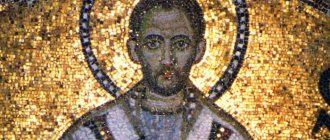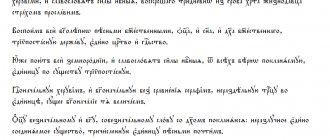“On the Rivers of Babylon”: Commentary on Psalm 136
February 15/28, 2021 – Sunday of the Prodigal Son, the second preparatory week for Lent. On the eve of this day, at the all-night vigil, the 136th Psalm “On the Rivers of Babylon” is sung. We offer readers of the website Pravoslavie.Ru a theological and philological commentary on this chant.
The Great Pentecost is preceded by four preparatory weeks. During this period, the Lenten Triodion offers many liturgical texts that prepare us for Lent. Thus, at Matins on the Sunday of the Prodigal Son and then on the Sunday of Meat and Cheese, after the singing of the polyelean psalms (134 and 135) “Praise the name of the Lord” and “Confess the Lord”, Psalm 136 “On the rivers of Babylon” is also sung.
The Typikon, giving liturgical instructions at Matins on the Sunday of the Prodigal Son, instructs us to sing the third psalm to the two polyeleos psalms: “On the rivers of Babylon” with a red alleluia[1]. The Church Slavonic phrase “red alleluia” is literally translated as “beautiful alleluia”[2]. It can be noted that the Typikon, prescribing this psalm to be sung in this way, sets it apart from the background of the previous two psalms.
Psalm 136 consists of nine verses. In the Church Slavonic texts of the Bible it is entitled with the words: “To David Jeremiah”[3]. In the Hebrew Bible, the psalm is not inscribed with the name of the author; in the Latin and Greek Bibles the name of David is written[4].
There are different opinions regarding the authorship of Psalm 136. The strong nostalgia for the homeland clearly expressed in it (verses 5-6) suggests that the author was among those captives who, after the decree of the Persian king Cyrus in 538 BC, returned to the destroyed Jerusalem.
The Church Slavonic text of Psalm 136 is as follows:
“To David Jeremiah.
On the rivers of Babylon, there weeping and lamenting, we will never remember Zion. On the willows in the middle of both of them are our organs. For there they asked us, captivating us about the words of the songs and leading us about singing: sing to us from the songs of Zion. How shall we sing the song of the Lord in foreign lands? If I forget you, O Jerusalem, my right hand will be forgotten. Cling my tongue to my throat, lest I remember you, lest I offer Jerusalem, as at the beginning of my joy. Remember, O Lord, the sons of Edom, who said on the day of Jerusalem: exhaust, exhaust it to its foundations. Accursed daughter of Babylon, blessed is she who will give you the reward that you have given to us. Blessed is he who hath, and shall dash thy infants against the stone.”[5]
Babylonian captivity
“On the rivers of Babylon” - the use of the plural in the phrase “by the rivers” (Kyiv translation) refers to the various areas along the Tigris and Euphrates rivers with their tributaries and artificial canals built by the Babylonians to irrigate their fields, where captive Jewish families were located and lived[ 6].
The plural of the verbs “sadohom and weeping” refers to the communication of the captives among themselves. They cry together and empathize with each other, remembering Zion - in this case, the word is associated with Jerusalem or the Temple.
We are in captivity to sin - “on the rivers of Babylon”
“On the willows... obesikhom” - the Church Slavonic verb “obesiti”, as well as the Greek “κρεμασθῆναι”, in the context of the 2nd verse is translated into Russian as “hanged”.
“Our organs” – the Greek text contains the word ὄργανα. It was borrowed into the Church Slavonic text without translation. The word ὄργανα is translated into Russian as “instruments”, while reading the synodal translation, we can understand that we are talking about musical instruments: “we hung our harps.” Musical instruments hung on trees indicate that the Jews put aside their fun.
The chant “On the Rivers of Babylon” reveals the whole meaning of Lent from the first verses. We are in captivity to sin - “on the rivers of Babylon.” Like the Jews, we need to put aside fun and think about our sins, remember Zion - the Kingdom of Heaven or Heavenly Jerusalem.
Songs of Zion
“For there they asked us, having taken us captive about the words of songs and leading us about singing: sing to us from the songs of Zion”: if translated from Hebrew, this verse reads like this: “There those who captivated us demanded from us the words of songs; and our oppressors - joy: sing to us from the songs of Zion."
“Voprosisha” - “ordered” or “demanded.” The captive Babylonians demanded that the Jews tell them a few words from the Divine songs and praises that they sang in Jerusalem[7].
“How can we sing the Lord’s song in a foreign land?” - this is how the fourth verse can be translated. “Why weren’t they allowed to sing in a foreign land? Because unclean ears should not have heard these mysterious chants,”[8] St. John Chrysostom interprets this passage[9].
“A foreign land” is not just a country far from the holy city, it is an unclean pagan land (see: Ezek. 4: 13–14), which provided “unclean bread.”
Saint John Chrysostom calls on us to observe ourselves with special care and build our real lives in such a way that we do not become captives, aliens and excommunicated from our fatherly city[10]. “We will all listen to this and learn from it. Just as when they were deprived of the city, then they began to look for it, so many of us will experience the same thing when on that day we are deprived of the heavenly Jerusalem,” [11] - this is how St. John comments on the 136th Psalm.
Jerusalem - the beginning of the fun
“If I forget you, O Jerusalem, my right hand will be forgotten. Cling my tongue to my throat, lest I remember you, lest I offer Jerusalem, as at the beginning of my joy”: the fifth and sixth verses are built on the principle of an oath: “If I forget, let my right hand forget me; If I don’t remember, let my tongue stick to the roof of my mouth.” The author of the psalm is ready to be punished for breaking his vows, that is, if he does not make Jerusalem the beginning of his rejoicing, may the Lord take away from him the opportunity to play the harp with his right hand, and forbid his tongue to sing the songs of Zion.
And the singing of this psalm in the preparatory period for Lent calls on us to make Jerusalem, the Kingdom of Heaven, the beginning of our joy.
Sons of Edom
The psalmist, turning to God, prays to the Lord that He would remember the atrocities of the Edomites that they committed during the destruction of Jerusalem in 587 BC. (see: Obd. 1: 10-15): “Remember, O Lord, the sons of Edom, who said on the day of Jerusalem: exhaust, exhaust it to its foundations.”
The Edomites, a kindred people to the Jews, were always hostile to their brother and took an active and evil part in all the sad events of his life (see: Amos 1: 11).
And the “day of Jerusalem” is the day when Jerusalem was completely destroyed, the city was deprived of defensive walls and towers, literally “stripped” (Is. 3: 17).
Daughter of Babylon
“Accursed daughter of Babylon, blessed is she who will give you your reward, even as you have rewarded us” - in the Russian translation of the psalm, the daughter of Babylon is called a devastator. The Greek text calls her “wretched” (ταλαίπωρος[12]), hence the word “cursed” - unhappy, pitiful[13].
The unsightly expression “blessed is he who takes and dashes your little ones against a stone,” according to some commentaries on the Psalter, indicates the crude and inhumane features of the Israeli religion. No matter how we feel about the words of the psalm, the psalmist, apparently, does not wish death for all the innocent children of Babylon, but asks the Lord to remember the very specific destroyers what they did to Zion.
“Babies” is an image of the beginnings of small indulgences and annoyances that can grow into ineradicable passions
And in spiritual life, many things can be compared to babies - this is the image of the beginnings of small indulgences and annoyances, which can grow into deep, ineradicable passions and vices. Now they seem so small and defenseless that it is somehow even cruel to resist them[14]. But it is precisely at this initial stage that it is necessary to fight them - “blessed is he who breaks them against a stone.”
***
Psalm 136, which is sung only three times a year during the all-night vigil during the preparatory weeks, shows us the great disappointment of the Jewish people, who lost their shrine - Jerusalem. The text also encourages us to think about the price of the great blessings that the Lord gives us.
Without any doubt, the sadness and tears of the Jewish captives should inspire us to cherish all the gifts sent from God.







